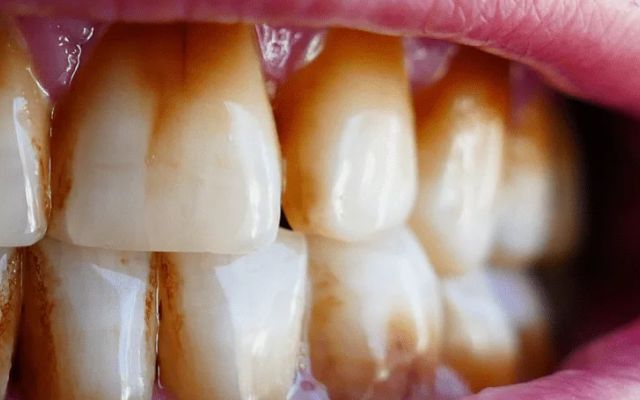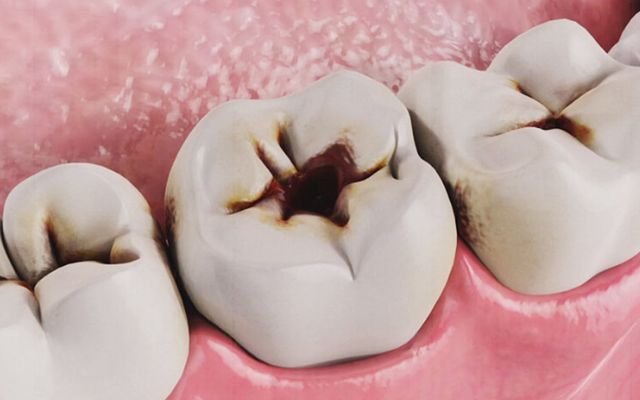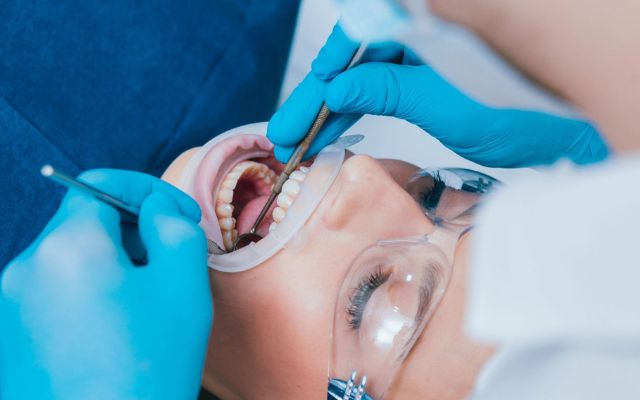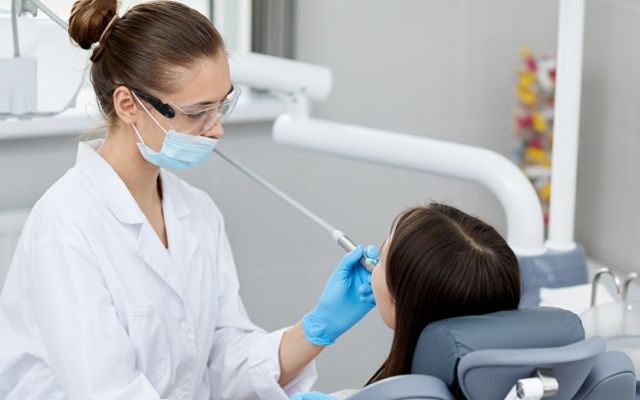Brown stains on teeth are a common problem in dentistry, and often cause low self-esteem and discomfort for sufferers. Whether due to diet, improper dental care, or natural aging, these stains can take away your bright smile and make you feel less confident. However, with advanced methods and technologies in modern dentistry, brown stains on teeth can be removed easily and safely. In this article, dentist Spring Orchid will provide you with the latest information on brown stains on teeth, including causes and treatment.
What Are Brown Stains On Teeth?


Brown tooth stains indicate the presence of plaque and germs on the tooth’s surface. Inadequate oral hygiene practises, such as infrequent or improper brushing, may lead to plaque buildup and germs on the teeth.
Brown or black stains may appear on the tooth surface when plaque and bacteria build up, causing acid to be produced and eroding the enamel. Dental issues like cavities and periodontitis may develop if plaque and germs aren’t regularly eliminated. To prevent and treat brown stains on teeth, proper oral care is critical:
- Brush your teeth at least twice a day with an antibacterial toothpaste and floss to clean the area between the teeth.
- Besides, limit sugary foods and drinks and adjust your diet to have healthy teeth.
If brown stains on the teeth have appeared, it is advisable to visit the dentist for timely advice and treatment.
What Causes Brown Stains On Teeth?


We should all make an effort to keep our teeth clean and white since it helps with self-esteem and dental hygiene. Brown stains on teeth are unsightly, but they are not impossible to get rid of if you change your lifestyle and avoid certain foods and beverages, as well as if you smoke or drink heavily. The Spring Orchid dentist will discuss the causes of brown tooth stains in the following section:
Nicotine


Nicotine is an addictive substance in cigarettes and can affect oral health.
Among those effects, brown stains on teeth are a common problem. For smokers, nicotine and other chemicals in tobacco accumulate on the surface of teeth and cause yellow, brown or black stains.
Without periodic whitening, these stains can become harder to remove and make teeth look unattractive. In addition, nicotine can also affect the health of the gums, causing gingivitis and tooth loss.
If you are a smoker, regular dental visits and teeth whitening are the best ways to keep your teeth healthy and attractive. In short, the nicotine in cigarettes can cause brown stains on your teeth and other oral health problems. Regular dental visits and routine teeth whitening are the best ways to maintain oral health.
Colored Food And Drinks
Different colored foods and drinks can cause brown spots on teeth. Foods and drinks that commonly cause brown stains on teeth include:
- Coffee, creamy coffee.
- Tea.
- Carbonated soft drinks.
- Red wine.
- Fish sauce.
- Curries.
- And dark chocolate.
In addition, foods that contain tannins, a compound that causes astringent and dark colors, can also cause brown stains on teeth. These foods include black currants, raspberries, sesame seeds, and licorice.
Besides, tooth enamel becomes stained brown when pigments bind to it. Teeth protect themselves from deterioration and wear with enamel. . The colours in the food and drink we ingest stick to the enamel, covering the teeth. Plaque left unchecked will color teeth brown.
Plaque And Tartar
2 important factors are plaque and tartar which cause brown stains on teeth.
- Plaque is formed when bacteria, fats, sugars and proteins in food are consumed in the mouth, combined with saliva and food remnants to create a sticky film on the surface of the teeth. Bacteria in plaque convert sugars into acids, which erode tooth enamel and form stains and wear. If not removed in time, plaque will grow and penetrate deep into tooth enamel, causing damage and decay.
- Tartar is a hard mineral layer that adheres to the surface of teeth. It is formed when minerals in saliva and food combine with bacteria and other organic matter on the tooth surface, forming a dense white mortar. However, if tartar is not removed in time, it will gradually become harder and cause brown stains on the teeth.
Tooth Decay


Tooth decay causes most brown tooth discoloration, according to dentists. Dental decay occurs when germs on the tooth surface consume dietary sugars and contaminants. This damages tooth enamel and raises infection and discomfort risk. These bacteria turn sugar into acid, eroding tooth enamel and causing cavities. Also, brown stains on teeth are a symptom of dental decay, according to studies.
Researchers at Tufts University in the United States discovered that the bacterium Streptococcus mutans may produce coloring compounds that may stain and darken teeth. These bacteria may potentially damage tooth enamel and result in cavities, according to the results of this research. Overall, tooth decay is a major contributor to tooth discoloration caused by dark stains. Brown stains on tooth enamel may be attributed to bacteria in the mouth, as has been shown by scientific studies.
Reduced Enamel Production
Enamel film (tooth enamel) protects teeth from bacteria and other harmful chemicals. Yet, when enamel formation slows, bacterial plaque and other noxious chemicals may more easily penetrate the tooth’s surface, causing yellow or brown discoloration.
Moreover, chemical agents like acids and corrosive chemicals, as well as the consequences of disorders like mouth ulcers, gingivitis, and tooth decay, are just a few of the numerous reasons for enamel hypoplasia. This issue can be mitigated. Dental hygiene decreases enamel formation. Fluoride toothpaste is used to clean between teeth twice a day.
Avoid sugary drinks and sticky foods and drink plenty of water to keep the mouth moist and decrease teeth surface pollutants. Also, Some study suggests that triclosan, fluoride, and xylitol-containing toothpaste may reduce enamel formation and prevent plaque and stains.
Old
Maintaining good oral hygiene and scheduling frequent dental checkups are essential for warding off the dark stains that might appear on teeth with age.
Tooth enamel and gum tissue are also helped along by maintaining a balanced diet and lifestyle.
Plaque buildup and tooth discoloration may be mitigated by, for example, cutting down on one’s usage of cigarettes and intake of soft drinks and caffeinated beverages. Thus, regular dental checkups and care are necessary to prevent the darkening of teeth that comes with aging.
A healthy diet and lifestyle are essential for maintaining strong teeth and enamel. Plaque development and the color that results in brown stains on teeth may be reduced by making certain lifestyle changes, such as giving up tobacco and cutting down on soda and caffeinated drinks.
Celiac Disease
Scientists say Celiac illness may colour teeth brown. Celiac disease is an immune disorder in which the body cannot digest gluten, a protein found in wheat, barley, and peanuts. Gluten-free diets are necessary for Celiac disease patients.
Micronutrient deficiencies—especially calcium and vitamin D—can result.
Also, some studies have shown that people with Celiac disease are at higher risk for calcium deficiency, which causes weak bones and teeth. So, Celiacs need daily oral care and frequent dental appointments.
Fortifying the diet with vitamins and calcium also helps teeth and bones. To strengthen tooth enamel and lessen the likelihood of brown stains, use vitamin D and calcium supplements.
Remove Brown Spots On Teeth At Bassendean’s Spring Orchid Dental


At the dentist, you may choose from a variety of treatments designed to remove dark stains from teeth. Nevertheless, the optimum approach will vary from patient to patient based on the root of the discoloration. A few of the most frequently used procedures at Bassendean’s Spring Orchid Dental Clinic are as follows:
Teeth Polishing
Tooth polishing is a common dental procedure to eliminate brown stains on teeth. But, before treating brown spots on teeth, it is important to pinpoint their origin.
- First, the dentist will undertake an oral checkup before polishing the teeth to discover the reason for the dark spots on the teeth. If the brown stain is caused by dental decay, the disease must be treated before the tooth may be polished. If dark spots on your teeth are produced by stains from bottles, cigarettes, or beverages, your dentist will advise you to reduce your use of these things or to rinse your mouth immediately after usage to lessen the effect.
- After determining the cause, the dentist will use the most modern polishing technology to remove brown spots on the teeth. This technology uses sophisticated tools to remove plaque and tartar on the tooth surface, making teeth whiter and more beautiful. The time to perform the polishing process is quite short, only about 30-60 minutes depending on the condition of the patient’s teeth.
Teeth Whitening


Teeth whitening is a common way to erase yellow or brown stains. Dentists endorse this safe, efficient procedure. A bleaching chemical, commonly hydrogen or carbamide peroxide, breaks down the colour molecules in dental stains to eliminate them.
At Spring Orchid dental clinic, we provide professional and safe teeth whitening services. Before starting the bleaching process, we will check the condition of your teeth and assess whether bleaching is appropriate for the condition of your teeth. In conclude, if bleaching is the right method, we will whiten your teeth by placing a layer of specialized whitening gel on the teeth, then activating it with light or heat to speed up the whitening process. The bleaching process can take from 30 to 90 minutes.
Porcelain Or Denture
If the stain on the tooth is too severe or cannot be removed by polishing or bleaching the tooth, the dentist may encourage the patient to use porcelain or denture to replace the stained tooth:
Ceramic tooth | Dentures |
Porcelain crowns are common dental restorations for damaged or missing teeth. Ceramic or composite materials are sculpted to resemble the repaired tooth’s original shape to create porcelain teeth. Porcelain teeth are bonded to the tooth using specific adhesive.
| Dentures are the typical treatment for discolored tooth patches. Acrylic resin or porcelain composite is used to make dentures. Adhesive or a specific bond is needed to secure dentures to natural teeth. But, false teeth are easy to care for, inexpensive, and cosmetically pleasing. The use of dentures is limited. There’s a chance that regular use can discolor or break down your denture’s components. Dentures are prone to damage as well. |
Dental Diagnosis And Treatment
If the stains on the teeth are caused by oral disorders such as cavities, gingivitis, and gum infections, pathological therapy will assist in removing the stains. So, contact us at Spring Orchid dental clinic in Bassendean for more information on brown spot removal and other oral care procedures.
Conclude


If you are looking for a dentist in Bassendean to whiten your teeth or improve your smile, look no further! Spring Orchid Dental is the place you can trust and put your trust in to bring you your perfect smile.
- Dentists Sara Nguyen and Ylan Pham are experts with many years of experience in the profession, and they are always ready to provide you with the best quality care possible. With a passion and special interest in cosmetic dentistry, they will provide the most suitable solutions to help you achieve the smile you have always wanted.
- In addition, strict adherence to the Australian Dental Association’s infection control process will give you absolute peace of mind about your health and safety during your treatment.
- Moreover, with reasonable prices and professional service, you will be welcomed in a comfortable and friendly environment, making you feel more comfortable and confident every time you visit.
Thus, if you want to find a professional and reliable place to whiten your teeth or improve your smile, book an appointment or call our hotline today to use dental services. We will bring you the best dental care experience.
FAQs
Can Brown Teeth Be Treated During Pregnancy?
Yes, they can. Throughout pregnancy, women’s dental health may undergo significant changes, and numerous issues concerning oral care arise. A change in the color of your teeth, particularly browning, is one of the most prevalent issues. In general, having brown teeth during pregnancy is nothing to worry about. Nevertheless, several dental medications used in treatment might pose a risk to the unborn child. Hence, you should discuss the possible effects of dental care on the health of your unborn child with your doctor before proceeding with treatment.
Is It Possible Not To Treat Brown Teeth?
You can, but we recommend you don’t. If left untreated, browning may cause major issues with your mouth’s health and reduce your overall quality of life. Moreover, it’s good knowing that acid-producing bacteria in the mouth are to blame for tooth discoloration and enamel erosion. Acid may erode away at the enamel of teeth and seep into the pulp, causing pain, infection, and eventual tooth loss if not addressed. However, having dark teeth might lower your self-esteem and negatively impact your daily life. Self-esteem and social interactions might suffer if you avoid smiling and chatting with others because of concerns about tooth discoloration.
Are brown stains treatable at home?
Yes, they are. Home remedies for tooth discoloration may help, but they are no substitute for expert dental care and may perhaps do more damage than good. Browning teeth may be treated with bleaching toothpaste, bleaching tape, or even natural teeth whitening treatments like baking soda or lemon juice. Nevertheless, teeth whitening treatments that aren’t prescribed by a dentist may lead to issues including tooth sensitivity, gum irritation, and even the growth of germs in the mouth. Itchy or swollen gums aren’t the only negative side effect of using improper items.





